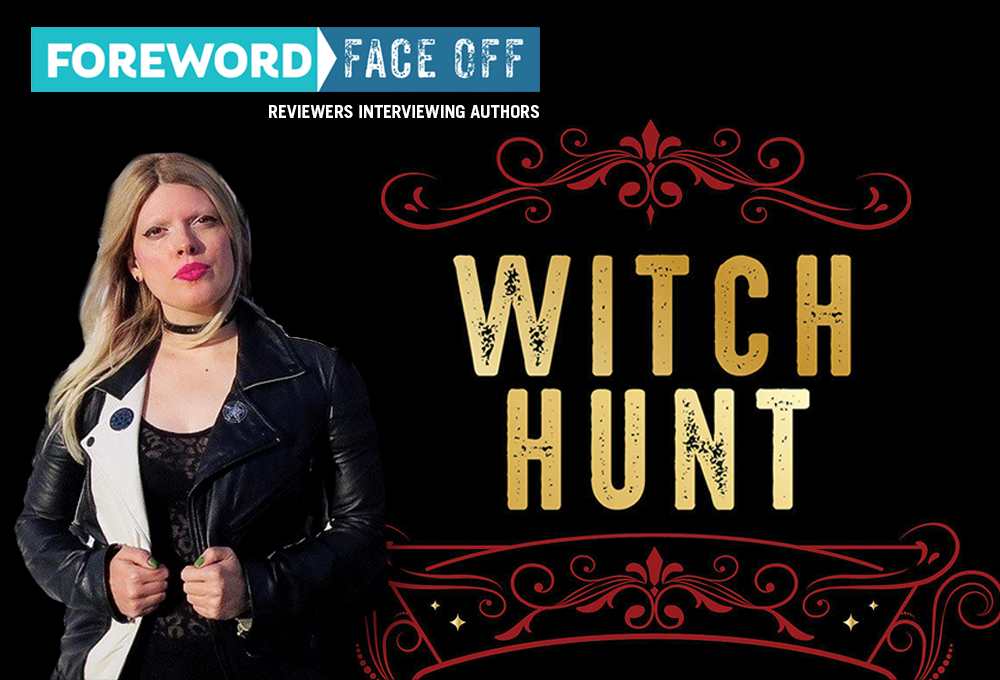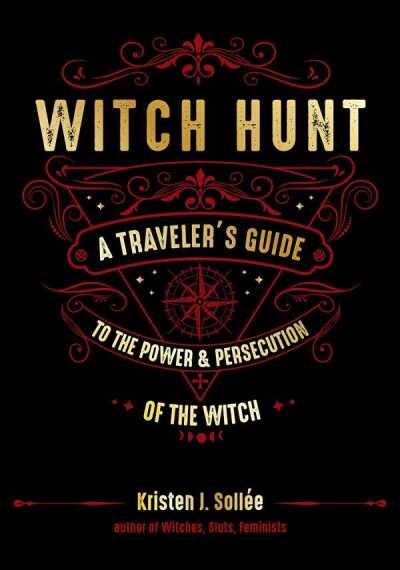Reviewer Matt Sutherland Interviews Kristen J. Sollée, Author of Witch Hunt: A Traveler’s Guide to the Power & Persecution of the Witch

Alright, let’s get this party started and ask you a question normally reserved for celebrities in glossy magazine interviews: If you could host a dinner party with anybody, living or dead, who would you choose?
We’ve always loved that question because the answers are hugely telling about the interviewee’s interests, ego, and personality. What would you think about a person who picked Marilyn Monroe, for example, or Jesus, or Thomas Jefferson?

These thoughts came to mind when we read the following interview Matt Sutherland conducted with Kristen Sollée, a bonafide twenty-first century witch. Matt just seems a little more excited than usual, as if firing questions at a real live witch has long been a dream of his. We originally raised an eyebrow when he gave Kristen’s new Witch Hunt a starred review in the September/October issue of Foreword, and then begged us to reach out to Weiser Books for help in setting up this reviewer-witch—we mean: reviewer-author—interview.
Who are we to judge? It looks like the two of them had a blast, and we learned a ton about the history of witchcraft and the life of a modern day sorcerer.
Enjoy!
Will you give us your witch manifesto? Why are you a witch? What does it mean to you? How do you practice your craft from day to day?
It’s important to emphasize that witchcraft is something you do—it’s a practice, not a single, unified belief system. There are as many ways of practicing witchcraft as there are self-identified witches in the world! My witchcraft is an ever-shifting process, but it revolves around honing perceptions and making connections with people, places, and things, whether I’m doing spellwork or ritual involving the moon, a mountain, a season, a candle, a bunch of kitchen herbs, an old Motley Crüe record, my cat, hot pink lingerie, or a stack of books. Witchcraft is a technology of change, so any ritual or spell I enact is ultimately about re-calibrating or shifting myself first and foremost so I can be better aligned with what I am seeking. If that sounds vague, it’s meant to, as some of the most potent magic is that which you keep secreted away…
Witch Hunt pulled at my heartstrings several times when you alluded to the connection you feel with all those tortured and murdered victims of past witch hunts. They’re your peeps, and even though the persecutions might have happened centuries ago, your empathy is moving and awesome to behold. Will you talk about the connection you feel to witches past and present? Do your powers allow you to telepathically connect with your brethren, perhaps even those no longer walking the earth?
First and foremost, I aimed to honor the victims of the witch hunts with this book, so I’m very glad to hear that came across. To me, identifying as a witch today means identifying with those persecuted by patriarchal religion, by corrupt institutions, by mob rule, by a distorted gender binary. Because of my ancestry and my practice in the present, I feel a connection to accused witches of the past. But I actually don’t think you need any ancestral connections or special “powers” to palpably feel trauma and loss when you visit the sites I did in my research. The structures and the land hold the memories, and if you have trained yourself to listen to your surroundings, what some call “geomantic empathy,” you are more likely to pick up pieces of the past in voices, in visions, in a strange feeling that overtakes you, even in whispers on the breeze.
To be a witch is to be a naturalist, keenly in tune with, observant of, and knowledgeable about the natural world. And, it seems quite logical that the powers wielded by the witch are a result of tapping into the powers of Mother Nature, planets, stars, and the rest. Is this accurate? Please talk about the importance of a witch’s close relationship with nature?
Absolutely. Witchcraft is inextricably bound to the natural world—just like everyone was before technology began to separate us from it. Divination through the solar system’s vicissitudes, harnessing the cycles of the seasons for spellwork, alchemizing plant and animal life for healing, these are all practices that fall under the witchcraft umbrella. It’s also why I think we’re seeing a witchcraft renaissance these days. As screen time has increased a thousandfold, so many folks are divested from nature that they feel a pull to work in harmony with the natural world for a change instead of using it or dominating it in the ways capitalism would like us to.
As documented in the book, your travels through Europe and the USA included many visits to places of worship. And with a wink and a smile, you have some fun pointing to Christianity’s complicated, sometimes complicit, mostly conflicted relationship with witchcraft. Is it true that religious leaders most often headed up the pursuit and persecution of witches throughout history? Does your average witch even believe in the devil? Evil? God? Does the practice of witchcraft also benefit from Christianity, just as the practice of Christianity benefits from a belief in witches, Satan, and evil?
There is an erroneous contemporary perspective that Christianity and witchcraft have always been anathema to one another. While that may hold with certain iterations of contemporary witchcraft, it wasn’t true of what was called witchcraft in the early modern period during the witch hunts. Very often the people accused of witchcraft were drawing from folk traditions as well as Catholic traditions for syncretic practices that would aid them in their everyday lives. As historian Matteo Duni notes of accused witches in Italy: “The vast majority of magical practices included elements borrowed from church rituals … Indeed, some of the most common types of love magic were known as ‘oriazoni,’ or prayers, whose format and language they mimicked.” So in that sense, witchcraft and Christianity have always been strange bedfellows and are inextricably entwined. Catholic inquisitors and, later, Protestant ministers did lead some of the charge against witchcraft during the witch hunts, but the secular authorities and communities themselves were often just as responsible for sparking persecutions. As far as the “average witch” is concerned, there isn’t one, so I wouldn’t dare make any broad characterizations of what other witches believe when it comes to good and evil, God and the Devil!
Will you give us a true sense of how and why a typical witch hunt was conducted—from rumor and accusation through to trial, torture, and burning at the stake? How often did cooler heads prevail?
There was no typical witch hunt, as laws and lore varied from region to region. A witch hunt led by a Catholic inquisitor in 15th century Italy would be different than say, one led by a Protestant magistrate in 17th century England or a Puritan minister in Connecticut. But to speak in sweeping generalities, someone would accuse someone else of a crime (or something that just seemed unholy), whether it was murder, causing illness or a miscarriage, using love magic to make someone cheat on their spouse, ruining crops, killing livestock, muttering curses under their breath, etc. Sometimes other people would come forward to affirm that the accused was indeed a witch because they had had a similar bad experience with them. Then a suspect would be arrested, and he or she would usually be stripped naked and probed for any telltale markings that might betray an alliance with the Devil: maybe a mole, an extra nipple, a birthmark. Then, the suspect would be asked repeatedly about the supposed crime they committed and their relationship with the Devil and with witchcraft. If they did not provide a suitable confession, they might be tortured in horrific ways. Sometimes the accused would confess under duress and be set free if they repented. Other times they would be convicted and hanged or burned at the stake. I don’t have any statistics at the ready for how often cooler heads prevailed, but it did indeed happen!
What’s the one witch cliché that drives you most nuts?
Hmmm … that’s a tough one because misinformation abounds! But I think above all else the belief that witchcraft and Satanism are synonymous really annoys me. There were witches long before Christianity and conceptions of the Devil even existed! (Hello Circe in the Odyssey or Erichtho in Pharsalia!) For that matter, folks need to read up on the history of Satanism too, because it’s a lot more about liberatory politics right now than it is right-wing conspiracy theories about killing children and worshipping the Devil. Goddess, give me strength! There is so much ridiculous stuff out there these days about witchcraft you’d think we were still living in early modern times.
Lastly, what’s next for your talented pen? Are you working on something?
Yes! I am turning my attentions to historical fiction, which I have been wanting to do for decades. Of course, it is witchy historical fiction, and, in fact, one of the witchcraft cases I write about in Witch Hunt will be the basis for it, but I can’t spill any more secrets than that …
Matt Sutherland
